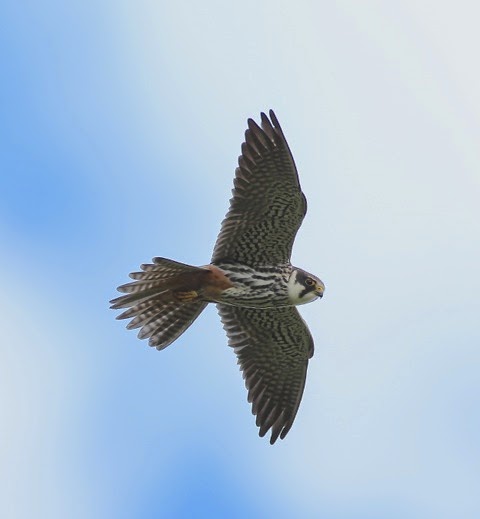 |
| Bullfinch (c) Tezzer |
 |
| Juvenile Great Tit (c) Tezzer |
 |
| Cuckoo one of at least three (c) Tezzer |
 |
| Sedgie (c) Mark Chivers |
 |
| All Hobbys (c) Mark Chivers (this one has a ring) |
 |
| Little Egret (c) Bark |
 |
| Redshank (c) Bark |
 |
| Three of the Mistle Thrushes (c) Bark |
 |
| Bounding Hare (c) Bark |
It was a weekend of mixed weather but with the exception of Sunday, it was
more wet than dry.
I went down on Saturday morning when the rain was a little less intense and
had the moor virtually to myself. To know a place really well it is good to see
it in all its moods and as Sherlock says “ there is no such thing as the wrong
weather only the wrong clothing” ( Terry that is not Holmes! ) Once I had
accepted the rain the place was very beautiful; somehow softer, fresher, wetter
and lusher with a dramatic sky that changed all the time, it felt a bit like
walking through a watercolour painting.
The weekend was to produce some exciting birds, although sadly the rarest
and most notable was only seen by one observer. The bird in question was a
Bee-eater that flew through on Saturday afternoon after the rain of the morning
had cleared. The bird was seen by a Hungarian birder who is very familiar with
the species from his own country and who hadn’t really realised the significance
of it here. The last ones in Oxfordshire were seen over twenty years ago, I also
believe that there was a single bird seen on Otmoor earlier than that, but have
been unable to confirm it. Despite the fleeting nature of this encounter and our
general disappointment that it didn’t stay, there were still plenty of other
birds to see. The Glossy Ibis continued to commute between the Closes ,
Greenaways and the Flood Field and was very elusive at times. The Summer
plumaged Ruff was seen at times on Big Otmoor on occasions displaying all its
finery to passing Redshanks.
The Turtle Doves near the pump house continued to attract admirers and
photographers. There is confusion as to whether these are two males or a pair. I
have spent some time trying to discover if both males and females purr but can
find nothing in BWP or on the web, any information on this would be really
useful. There were a further two birds seen midweek and other reports have come
in from nearby locations.
On Sunday a Great White Egret was found on a field to the north of the
reserve and later flew onto Greenaways. It was seen again on the Flood Field on
Monday morning but shortly afterwards was seen to fly off high towards the east.
Although almost annual now in the county it is always a thrill to see this
beautiful Heron, stunning pictures of the bird taken by Roger Wyatt can be seen
on the Oxon Bird Log.
Hobbys have also been very much in evidence and are now hunting low along
the ditches for dragonflies there have been up to six still present and they are
always easier to see in the afternoons and evenings. On Sunday morning we found
a group of fourteen Mistle Thrushes feeding in the field to the west of the
visitor trail to the second screen, they were very fresh and bright looking
perhaps a late migrating group or a party of juveniles. There were also a family
party of five seen in Noke on Friday.
At least two Downy Emerald Dragonflies were seen and they do seem to be
established as Otmoor regulars now.
Juvenile birds are now starting to appear and a family of Great Tits that
have bred in or around the pumphouse were trying their wings for the first time
on Friday. I saw my first fledged lapwing chicks on The Closes on Saturday
morning recognisable by their yellowish faces and lack of a crest. If the
weather settles down we can look forward to more id challenges from juvenile
warblers and hopefully other new arrivals.
A sad footnote an Otter was found dead this morning on the road between Horton and Beckley, might even be the one seen early on Sunday morning by the pumphouse.



No comments:
Post a Comment